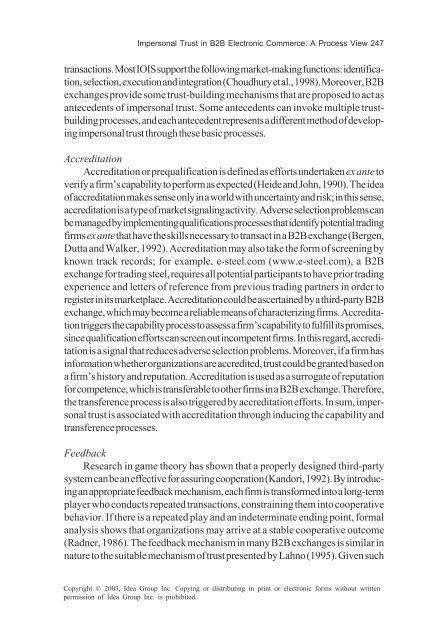www.sharexxx.net - free books & magazines
www.sharexxx.net - free books & magazines
www.sharexxx.net - free books & magazines
You also want an ePaper? Increase the reach of your titles
YUMPU automatically turns print PDFs into web optimized ePapers that Google loves.
Impersonal Trust in B2B Electronic Commerce: A Process View 247<br />
transactions. Most IOIS support the following market-making functions: identification,<br />
selection, execution and integration (Choudhury et al., 1998). Moreover, B2B<br />
exchanges provide some trust-building mechanisms that are proposed to act as<br />
antecedents of impersonal trust. Some antecedents can invoke multiple trustbuilding<br />
processes, and each antecedent represents a different method of developing<br />
impersonal trust through these basic processes.<br />
Accreditation<br />
Accreditation or prequalification is defined as efforts undertaken ex ante to<br />
verify a firm’s capability to perform as expected (Heide and John, 1990). The idea<br />
of accreditation makes sense only in a world with uncertainty and risk; in this sense,<br />
accreditation is a type of market signaling activity. Adverse selection problems can<br />
be managed by implementing qualifications processes that identify potential trading<br />
firms ex ante that have the skills necessary to transact in a B2B exchange (Bergen,<br />
Dutta and Walker, 1992). Accreditation may also take the form of screening by<br />
known track records; for example, e-steel.com (<strong>www</strong>.e-steel.com), a B2B<br />
exchange for trading steel, requires all potential participants to have prior trading<br />
experience and letters of reference from previous trading partners in order to<br />
register in its marketplace. Accreditation could be ascertained by a third-party B2B<br />
exchange, which may become a reliable means of characterizing firms. Accreditation<br />
triggers the capability process to assess a firm’s capability to fulfill its promises,<br />
since qualification efforts can screen out incompetent firms. In this regard, accreditation<br />
is a signal that reduces adverse selection problems. Moreover, if a firm has<br />
information whether organizations are accredited, trust could be granted based on<br />
a firm’s history and reputation. Accreditation is used as a surrogate of reputation<br />
for competence, which is transferable to other firms in a B2B exchange. Therefore,<br />
the transference process is also triggered by accreditation efforts. In sum, impersonal<br />
trust is associated with accreditation through inducing the capability and<br />
transference processes.<br />
Feedback<br />
Research in game theory has shown that a properly designed third-party<br />
system can be an effective for assuring cooperation (Kandori, 1992). By introducing<br />
an appropriate feedback mechanism, each firm is transformed into a long-term<br />
player who conducts repeated transactions, constraining them into cooperative<br />
behavior. If there is a repeated play and an indeterminate ending point, formal<br />
analysis shows that organizations may arrive at a stable cooperative outcome<br />
(Radner, 1986). The feedback mechanism in many B2B exchanges is similar in<br />
nature to the suitable mechanism of trust presented by Lahno (1995). Given such<br />
Copyright © 2003, Idea Group Inc. Copying or distributing in print or electronic forms without written<br />
permission of Idea Group Inc. is prohibited.









